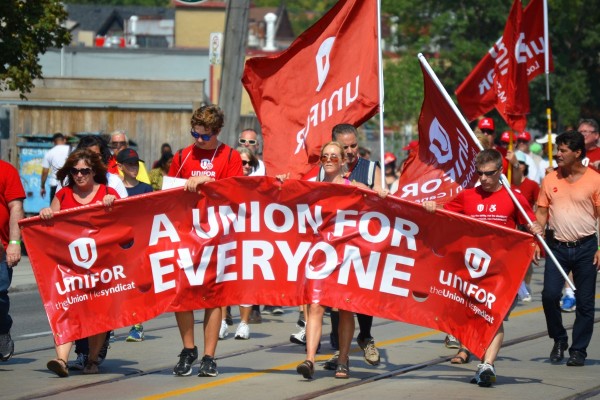It shouldn’t have taken this long for the BC NDP to legislate paid sick leave

That it took more than a year into a once-in-a-generation public health crisis for an NDP government to introduce such a basic provision as provincial sick pay is beyond disappointing. Image by Canadian Dimension.
Following months of pressure and after more than a year into the COVID-19 pandemic, British Columbia’s NDP government has finally announced plans to introduce a permanent paid sick leave program to cover the gaps in the federal government’s lacklustre Canada Recovery Sickness Benefit (CRSB).
After failing to allocate money for a provincial program to replace or improve the CRSB in the recent provincial budget, Premier John Horgan announced this week the province will implement its own program to be administered through WorkSafe BC (WCB).
Horgan said he had hoped the federal government would improve CRSB, but that his government decided to take action after it became clear no additional support was coming.
At the time of writing, further details of the provincial program are yet to be announced. Regardless of what the program looks like, however, it should not have taken this long for the BC NDP to take action in response to the CRSB’s glaring issues.
Currently, 53 percent of BC workers have no paid sick leave, with that figure rising to 89 percent for workers earning less than $30,000 a year, according to data from the Canadian Centre for Policy Alternatives.
This lack of paid sick days has forced many workers to choose between ignoring symptoms (and potentially spreading COVID at work), or losing the pay they need to make rent and buy groceries. BC has seen workplace outbreaks at chicken-processing plants, restaurants, long-term care homes and elsewhere.
The CRSB, introduced by the feds last summer following pressure from Horgan, is temporary and only applies to COVID-19. Further, it pays out a weekly sum that amounts to less than the minimum wage for someone working full time, and workers must miss at least half a week to qualify for the benefit. The application process requires workers to lose their pay first, then receive funds, sometimes weeks later.
Embarrassingly for the BC NDP, Ontario Premier Doug Ford was quicker to announce details of his government’s (albeit woefully inadequate) program to address some of those gaps.
While Ford’s very weak program is temporary and provides just three paid sick days, it is a bad look for Canada’s only social-democratic government to have been paired with a conservative regime in dragging its feet on this issue. We can expect that Horgan’s program will be better than Ford’s, but it should not have taken this long for the BC premier to act.
In fact, the BC NDP had good reasons to legislate paid sick leave long before the pandemic even began. Calls for paid sick leave in Canada are nothing new, nor have they only been made by labour and advocacy groups.
An article in a 2014 edition of the Canadian Medical Association Journal explained that both the Public Health Agency of Canada and the World Health Organization recommend that people stay home from work if they have the flu, and that workers who handle food stay home if they have gastroenteritis or other contagious diseases. However, the article notes:
Employees who have access to paid sick leave are more likely to stay home when advised to do so by a physician; employees with no sick leave are more likely to go to work and expose others to infection.
The article goes on to state that provinces should ensure workers don’t lose their jobs while taking sick leave: “Policy-makers and practitioners should work together to ensure that each province passes at least basic legislation requiring all employers to hold a job for a sick employee for 10 days.”
The reason many are calling for sick leave provisions to be enshrined through provincial employment standards is that such laws cover the majority of workplaces. As Canadian Centre for Policy Alternatives economist Iglika Ivanova recently explained, “we can have a seamless program where the worker doesn’t lose pay at all, they just continue to get paid at the same rate that they’re getting paid before, and the employer covers that.”
The need to legislate paid sick leave has been brought to the NDP government’s attention for some time. Back in 2018, ahead of the BC NDP’s first full provincial budget after it formed government in the summer of 2017, the BC Federation of Labour called on the government in its pre-budget submission to “introduce paid sick leave.”
The pandemic brought the urgency of this and other long overdue labour reforms into sharp focus. Over the past year, unions and health professionals across Canada have stepped up calls on provinces to introduce paid sick leave to reduce the number of workplace outbreaks. Earlier this month, the CMA stated that paid sick leave in all provinces is “urgently required.”
Last summer, instead of changing BC’s Employment Standards Act, Horgan played a leading role in lobbying Prime Minister Justin Trudeau to set up the CRSB. However, Horgan’s push for this program centred the concerns of business groups from the get go.
The BC premier, with a coalition of business leaders, argued last May that it would be unfair for employers to shoulder the costs of a sick-pay program on the basis that some have struggled to stay afloat during the pandemic.
Val Litwin, CEO of the BC Chamber of Commerce, said at the time: “to add now having to cover sick pay during what is a public health crisis, would essentially instantly bankrupt thousands-of-thousands of businesses.”
While it’s true that many smaller businesses have struggled, others’ profits have soared. To give one example, BC Chamber member Shoppers Drug Mart has been described as a “huge pandemic winner,” with same-store sales increasing more than 10 percent last fall. Grocery store chains have also raked in huge profits throughout the pandemic, particularly during the first wave.
More recently, the BC NDP’s rhetoric around the issue has continued to emphasize concerns from business groups.
Before announcing its plans for a new provincial sick pay program, the province said last week it was converting its $500 million “InBC” investment fund into a Crown corporation, with the aim of supporting “small and medium-sized businesses.” During the announcement, Horgan said businesses need support in providing paid sick leave, and that he was “disappointed” Ottawa did not fix its broken program in the federal budget.
The province could easily address that concern by picking up the tab for a portion of sick-pay costs for businesses able to demonstrate pandemic-caused hardship (similar to how the Canada Emergency Wage Subsidy program worked).
But even with that temporary provision, business groups are never going to support a permanent program that continues after the pandemic, and every day Horgan has spent delaying this necessary measure while also transferring hundreds of millions of dollars to the business sector is another day many low-income workers must choose between showing up to work sick or losing pay.
British Columbians have also been poorly served by the opposition parties on this matter. While the BC Liberals’ opportunistic attempts to make hay of the issue have zero credibility given their very poor record on protecting workers’ rights, the BC Green Party has also failed to hold Horgan’s feet to the fire.
Only this week, after the NDP indicated it was going to introduce a new program, did BC Green leader Sonia Furstenau finally mention the need for “a program to fix the gaps on paid sick leave.” Even that overdue statement, however, did not specify the need to legislate sick leave through the Employment Standards Act permanently, rather than simply patching up the feds’ broken program with more temporary measures.
Instead, the onus has largely fallen on unions and worker organizations, such as the BC Fed and the Worker Solidarity Network, which advocates on behalf of non-unionized and precarious workers.
In a petition signed by groups including Vancouver and District Labour Council, Together Against Poverty Society, the BC Government and Service Employees Union, UFCW 1518 and Hospital Employees Union, WSN has been calling on the BC NDP to change the Employment Standards Act for 21 days of paid sick leave during the pandemic, plus one hour of sick pay accrued for every 35 hours worked after the pandemic is over. It remains to be seen whether the BC NDP’s program will actually live up to these crucial demands.
Whatever the program looks like, the fact that it took this long to get an NDP government to introduce such a basic provision as provincial sick pay during a once-in-a-generation public health crisis raises questions about its readiness to seize the moment and introduce ambitious measures required to address a range of other issues, from childcare to fighting global warming. The recent provincial budget, as noted by Ivanova, offered little more than a status quo map to a post-pandemic future, and there are few signs this trajectory will significantly change anytime soon.
Absent any effective opposition parties prioritizing workers’ interests in the BC legislature, it will likely fall to the labour movement and its allies to continue holding the NDP to account during the next three-and-a-half years of the party’s governing mandate. It shouldn’t take this much effort to win such basic protections, but the needed reforms are too important to let the NDP delay or ignore them.
Alex Cosh is a regional news reporter for PressProgress and former opinions editor for rabble.ca based in British Columbia.










